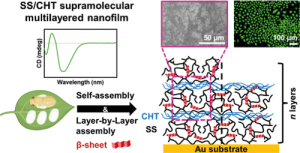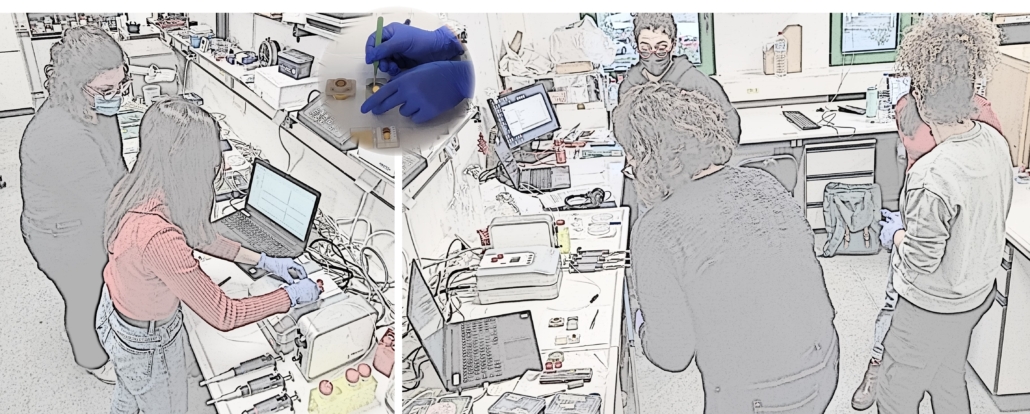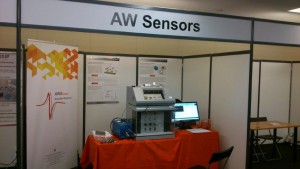We are proud to sponsor…
AWSensors is proud to sponsor Physical Virology: across length scales EMBO-FEBS Lecture course that will take place June 01 – 06, 2025 in Sant Feliu de Guixols, Spain.
AWSensors is proud to sponsor Physical Virology: across length scales EMBO-FEBS Lecture course that will take place June 01 – 06, 2025 in Sant Feliu de Guixols, Spain.
AWSensors is proud to sponsor the 2025 FEBS Advanced Lecture Course Biological surfaces and interfaces: biointerfaces at lipids, proteins and polymers that will take place June 8–13 2025 in Sant Feliu de Guixols, Spain.
Authors: Miguel Rosas, Cristiana F. V. Sousa, Ana Pereira, Adérito J. R. Amaral, Tamagno Pesqueira, Sónia G. Patrício, Sara Fateixa, Helena I. S. Nogueira, João F. Mano, Ana L. Oliveira, and João Borges
Journal: Biomacromolecules
 Abstract: Silk sericin (SS) has been widely discarded as a waste by the silk textile industry during the degumming process to obtain fibroin. However, in the past decade, an in-depth understanding of its properties and functions turned it into a high added-value biomaterial for biomedical applications. Herein, we report the molecular design and development of sustainable supramolecular multilayered nanobiomaterials encompassing SS and oppositely charged chitosan (CHT) through a combination of self-assembly and electrostatically driven layer-by-layer (LbL) assembly technology. The successful buildup of SS/CHT multilayered nanobiomaterials was demonstrated by the quartz crystal microbalance with dissipation monitoring and attenuated total reflectance-Fourier transform infrared spectroscopy, and the nanofilms’ wettable properties and nanofibrillar-like topography were shown by water contact angle, atomic force microscopy, and scanning electron microscopy. In vitro assays demonstrated the cytocompatibility of the LbL nanofilms toward human primary dermal fibroblasts, holding great promise as biofunctional nanocoatings for drug/therapeutics/cell delivery, tissue engineering, and regenerative medicine.
Abstract: Silk sericin (SS) has been widely discarded as a waste by the silk textile industry during the degumming process to obtain fibroin. However, in the past decade, an in-depth understanding of its properties and functions turned it into a high added-value biomaterial for biomedical applications. Herein, we report the molecular design and development of sustainable supramolecular multilayered nanobiomaterials encompassing SS and oppositely charged chitosan (CHT) through a combination of self-assembly and electrostatically driven layer-by-layer (LbL) assembly technology. The successful buildup of SS/CHT multilayered nanobiomaterials was demonstrated by the quartz crystal microbalance with dissipation monitoring and attenuated total reflectance-Fourier transform infrared spectroscopy, and the nanofilms’ wettable properties and nanofibrillar-like topography were shown by water contact angle, atomic force microscopy, and scanning electron microscopy. In vitro assays demonstrated the cytocompatibility of the LbL nanofilms toward human primary dermal fibroblasts, holding great promise as biofunctional nanocoatings for drug/therapeutics/cell delivery, tissue engineering, and regenerative medicine.
AWSensors ran a successful hands-on training workshop at the Gizeli group at IMBB FORTH in Crete, Greece. Undergraduate students, graduate students, and postdocs were invited to attend the session and learned how to use our X1 QCMD instrument and Love-SAW devices. During the workshop, participants had the opportunity to understand how to effectively utilize these acoustic sensing technologies for their research. Building on their core expertise in molecular biology and biophysics, the Gizeli group is exploring biosensing applications in human, animal, and plant disease diagnostics as well as pathogen and environmental pollutant detection. The training helped researchers in the group exploit the unique advantages of AWSensors’ equipment, such as sensitivity, time resolution, flexibility, integrated flow control, and ease of use, for biosensor development.

May 4th 2017
AWSensors technology will be at the 5th International Conference on Bio-sensing technology to be held at Riva del Garda, Italy, from May 7th to 10th. We are pleased to invite you to see our biosensing platforms at the booth of Bio-Logic, our OEM distributor.
AWS A20-F20 platform is the most flexible and sensitive QCM-D system in the market. It is able to work with low and high frequency QCM sensors and SAW sensors. It also ensures high sensitivity because of a novel method of characterization that keeps noise at very low level in spite of working at high frequencies by using AWS-HFF sensors (100-150 MHz). AWSensors also provides QCM and SAW sensors and a wide range of cells and accessories to customize experiments and tests according to specific conditions required by scientists.
Therefore, AWS A20 system provides you with big competitive advantages:
– High flexibility, capable to work with any acoustic wave sensor; modular system capable to be upgraded with more channels after purchase (up to 4)
– High sensitivity
– Customization, with accessories to make measurements in specific conditions
– Price convenience
Do not miss the opportunity to check the advantages of our technology at the booth of Bio-Logic and meet our Application Scientist, Mrs. María García.
May 13th 2016
Are you interested in how acoustic wave sensors could be useful for your research? Join the workshop on AWSensors technology to be held next June 14th at Cook Hall RM 2058, Northwestern University, 2220 Campus Drive, Evanston, IL, 60208, United States.
Prof. Antonio Arnau, founder of AWSensors, and Dr. Jose Vicente García, Product Engineering Manager, will give a session on classical quartz crystal sensors and other highly sensitive technologies such as AWS high fundamental frequency sensors. Furthermore, some biosensing and electrochemistry experiments will be conducted, so that the attendees will have the opportunity to see how the AWSensors equipment works.
We are very grateful for being hosted by Prof. Shull and his research group from the Department of Materials Science and Engineering in Northwestern University. Prof. Shull will introduce the workshop. He is one of the most prestigious researchers on the properties of polymer surfaces and interfaces, with a research emphasis on the adhesion of “soft materials”, including traditional pressure-sensitive adhesives and highly specialized polymeric gels commonly used in biomedical applications. His group is currently using AWSensors platform and they are publishing results. Our EQCM probe module was especially designed for Prof. Shull group and now it is being sold succesfully to other labs.
We would like to appreciate the assistance given by Kazi Sadman, researcher at Prof. Shull group, to organize this workshop. Please, if you are interested in attending, do not hesitate to contact us directly or by registering here.
We will be more than happy to meet you at Northwestern University!

May 13th 2016
AWSensors will join the Bio Convention next week in San Francisco, US. You may meet us at Spanish Pavilion in booth 605 or in the one-on-one partnering in the Bio Business Forum.
Prof. Antonio Arnau will attend the convention to explain how AWS sensing technology works and its applications in health or agri-food research. Furthermore he will introduce the european project LiqBiopSens and how our sensing technology will be used to developed a liquid biopsy platform for early detection of colorectal cancer.
The Bio International Convention (BIO) attracts over 15,000 biotechnology leaders. We will spend one week of intensive networking to discover new opportunities and promising partnerships with some biotech, pharma and industry leaders and several academic institutions that are attending the most important event in the biotech industry worldwide.. This event covers a wide spectrum of life science and application areas including nanotechnology, drug discovery, genomics, cell therapy or biofuels.
70% out of R+D in bio field is conducted in US where there are more than 2500 companies in this sector.
We are proud to attend the event along with other Spanish biotech companies, a group of about 70 companies together in the Spanish pavilion as you can look up at the SpainBio catalogue.
If you would like to meet with Prof. Arnau in San Francisco from june 6 to 9, do not hesitate to contact us!

May 13th 2016
Visit the booth of our distributor, Bio-Logic, to see our new products
Just one week left for Biosensors 2016! AWSensors technology will be at the most prestigious congress on biosensing research to be held at Gothenburg, Sweden from May 25th to 26th. We are pleased to invite you to see our platforms at the booth of Bio-Logic, our OEM distributor. There, you will see how our platform works.
Our equipment is the only quartz crystal microbalance that allows:
– Detection and characterization of interface phenomena with high sensitivity (up to 0.05 ng/cm2)
– Use of different kind of sensors simultaneously.
Our technology is based on two fundamental principles:
As a result, an improvement in the limit of detection (LOD) of 2 orders of magnitude compared to traditional acoustic sensors is obtained.
Do not miss the opportunity to check the advantages of our new technology and meet AWSensors founder, Prof. Antonio Arnau. He is coordinator of the International Network of Piezoelectric Transducers Research and Applications (PETRA) and has wide expertise on bioelectronics and acoustic wave biosensors.
Dr. Arnau will attend the Post Congress Symposium in Cancer Diagnostics to be held on Saturday 28 May inmediately following Biosensors 2016. AWSensors is currently coordinating LiqBiopSens European Project to develop a new liquid biopsy platform for early detection of colorectal cancer.

The control of chemical residues is essential in honey’s marketing to ensure consumer safety. Equipments available in the market reach the required limit of detection (LOD) (e.g Liquid Cromatography -HPLC) but are not suitable for in-situ implantation in honey packaging industry because they are more expensive and time-consuming and require highly qualified staff. Other approaches available in the market, although faster and without the need of qualified staff, do not reach the required LODs.
However, piezoelectric immunosensors like HFF-AWS based on High Fundamental Frequency Quartz Crystal Microbalance, combined with an antigen-antibody recognition process, are a good alternative or complementary technology for chemical residues control in food. Why? Let us tell you only 5 strong reasons to justify it:
| Analytical parameters (µg L-1) | HFF-QCM immunosensor | ELISA1 | SPR immunosensor2 |
|---|---|---|---|
| I50 | 0.62 | 0.74 | 1.06 |
| LOD | 0.08 | 0.15 | 0.03 |
| LOQ | 0.16 | 0.22 | 0.11 |
| WR | 0.16 – 2.37 | 0.22 – 2.47 | 0.11 – 10.07 |
AWSensors showed its work entitled “HFF-QCM immunosensor for fast and sensitive detection of DDT in Honey” in the Third International Congress on Quality and Food Safe Acofesal 2015 held in Valencia. We are pleased to share it with you. You can look it up HERE.
June 22th 2015
AWSensors showed its work on carbaryl pesticide during the 4th International Conference on Biosensing Technology held in Lisbon, Portugal, last month. Attendees were very interested in how AWS platform provides ELISA limit of detection. Therefore, we would like to explain and share on line the work entitled “Further sensitivity enhancement of HFF-QCM immunosensors for pesticides”.
 AWSensors have successfully developed a High Fundamental Frequency Quartz Crystal Microbalance that improves sensitivity of QCM biosensors. Taking advantage of this technology, AWS developed and tested a renewed highly sensitive HFF piezoelectric immunosensor for its use in pesticide detection, using insecticide carbaryl as a model analyte. To this purpose, 100 MHz quartz crystals were used as the transducer elements of the biosensor and a monoclonal antibody-based
AWSensors have successfully developed a High Fundamental Frequency Quartz Crystal Microbalance that improves sensitivity of QCM biosensors. Taking advantage of this technology, AWS developed and tested a renewed highly sensitive HFF piezoelectric immunosensor for its use in pesticide detection, using insecticide carbaryl as a model analyte. To this purpose, 100 MHz quartz crystals were used as the transducer elements of the biosensor and a monoclonal antibody-based
competitive immunoassay was integrated as the sensing specific bio-recognition event. The biosensing interface was improved by employing mixed self-assembled monolayers of alkane thiols as intermediate layers for surface functionalization. This approach allowed the covalent attachment of the assay conjugate on the gold electrode surface in a more orderly and stable way than with simple SAMs. Moreover, a very low concentration of LIB-CNH45 monoclonal antibody was used for the competitive immunoassays. The sensitivity enhancement achieved turns the HFF-AWS pesticide immunosensor into one of the most sensitive analytical tools for this kind of low molecular compounds. Don’t lose the opportunity to take advantage of this innovation. AWSensors offers its new technology at the best price.
CLICK TO DOWNLOAD the poster about this work
